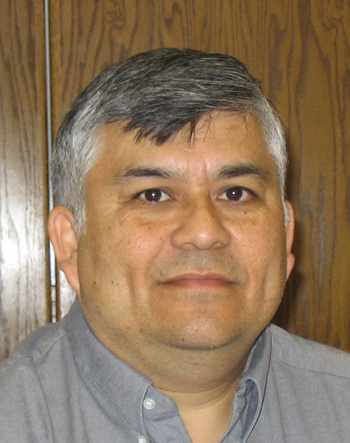PABLO GUAJARDO
|
BIOGRAPHICAL
INFORMATION
Pablo Guajardo was born on May
23, 1952 in Mercedes, Texas, and is of Chicano descent.
Despite many challenges in his youth, he described his town
as a warm and loving environment where he spent 21 years of
his life. He came north to Moorhead, MN at his father’s
request in 1973. He found his new home interesting but
challenging, as Fargo-Moorhead required both physical and
cultural adjustments.
Mr. Guajardo has worked for the
State of Minnesota for twenty-seven years, twenty-two years
as a professional and the other five years as a skilled
laborer. His role as a leader helped many migrants to find
jobs in Fargo-Moorhead area. Being so actively involved in
Moorhead, both as a Migrant Labor Representative for the
Department of Economic Security and the chairperson of the
Minnesota Migrant Council Board, Mr. Guajardo has been able
to meet many people in the community. In 2001, Pablo
Guajardo became the first Latino person to run for a seat on
the Moorhead City Council—one of the many ways in which he
has contributed to the leadership of his community.
In his interview, Mr. Guajardo
shares his recollections of his historic campaign, and
reflects on the cultural cost for Chicanos who live in the
area. He also addresses diversity in the community, and how
it has been affected by a changing economy, as well as his
perception that people of color continue to be measured by a
“different yardstick.”
Mr.
Guajardo was interviewed on April 23, 2004 by
Vusalya Bentley, Raul Fernandez, and Jindallay Simmons.
|
|
SAMPLES
FROM THE INTERVIEW
ON
HIS CAMPAIGN FOR MOORHEAD CITY COUNCIL:
"They
wanted to talk, they were the elderly that whether they are shut in or
they’re happy that someone is knocking on the door and gives them the
time of day, sometimes we forgot what I was doing for them. We would sit
down; drink coffee with them, had a cookie with them. And we would talk
about something else, completely nothing to do with the campaign. But
they had something in their mind that they wanted to get and talk to me
about. I said, “Why not?” You listen to people. When you listen to
people you going to see what their needs are. One of them, one of their
needs was that they were worried what going to happen to them when they
no longer—I mean, as a city council person I couldn’t do anything about
it. I couldn’t, because we don’t make those kinds of regulations. But I
was able to sit down and just hear them out. A lot of times all you have
to do is sit down and hear those individuals in the community. And these
weren’t Hispanic individuals or Chicanos; these were white Anglo-Saxon
individuals that are getting up there in age. And just by doing that—I
did not win. I came close, but I didn’t win. And I felt that it was a
very successful campaign considering that I only did maybe one week of
campaigning. And I did it all by myself. And, but, you see it every day.
I have to prove myself every single day of my life. Because when,
whether it is at work, whether it is in the community I am measured with
a different yardstick. Because of the color of my skin. When I live,
when I am leaving my job site. And I work at night, and I work as a
janitor here. I chose to do that work versus moving from this area. When
I leave my station I have shaved, I have changed shirts, and I have
combed my hair, ‘cause when I walk out of that building I have to put a
different picture. So those individuals that are working with me, or if
I run—I am an ambassador."
|
|
|
